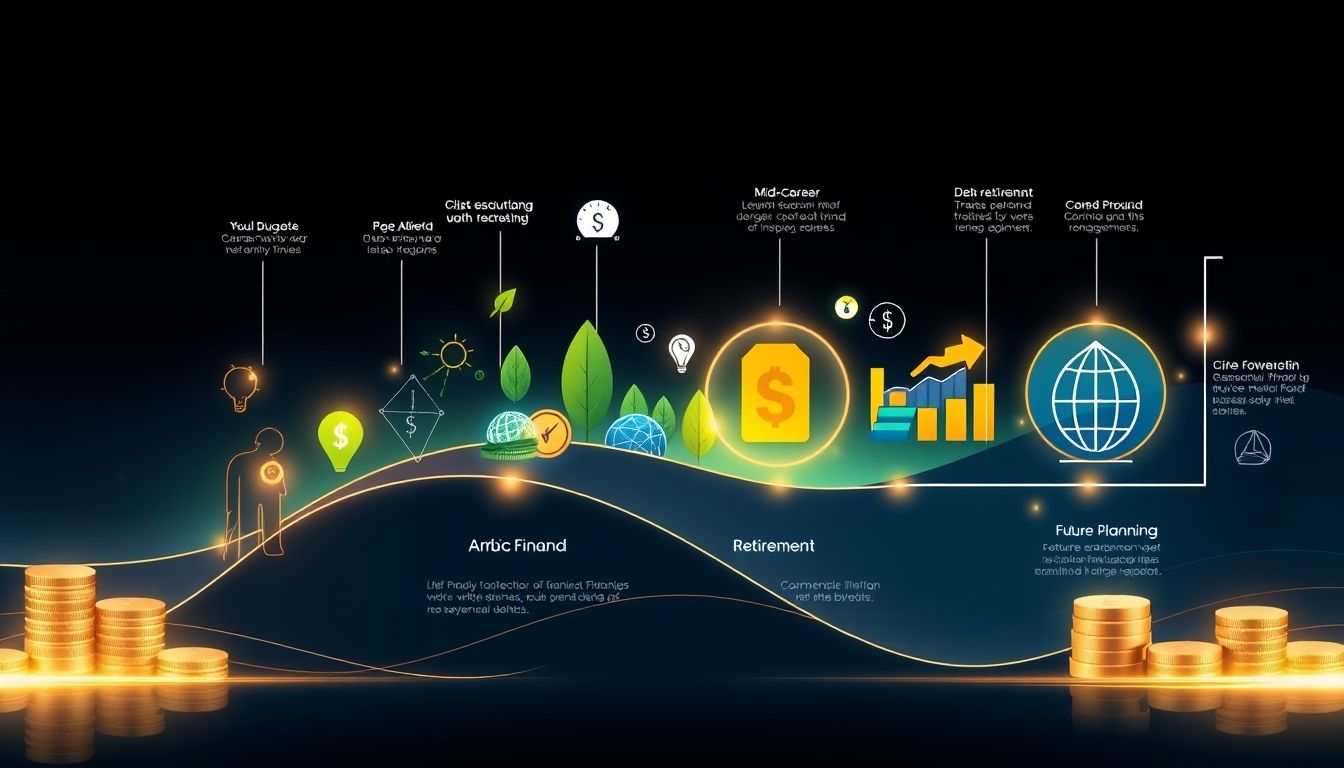Introduction: Smart Saving is a Journey That Begins and Never Ends
In today's world, financial planning and smart saving have become essential for achieving financial stability and future prosperity. Saving is no longer just an option; it is a fundamental strategy for facing increasing economic challenges and achieving personal and professional goals. This article serves as a comprehensive roadmap, providing smart and tailored saving strategies to meet the unique needs of each age group in the Arab world, taking into account prevailing economic and social conditions.
Chapter 1: The Importance of Financial Planning and Saving in the Arab World
Financial planning and saving are not just theoretical concepts; they are practical tools for achieving financial independence and securing the future. In the Arab world, the importance of these tools is increasing due to various economic and social challenges, such as:
- Fluctuations in oil prices: Directly affecting the economies of the region.
- High unemployment rates: Especially among young people, making saving more difficult.
- Inflation: Reducing the purchasing power of individuals.
- Social and cultural conditions: Such as responsibilities to support extended families.
Therefore, financial planning and smart saving are more important than ever.
Chapter 2: Saving in Young Adulthood (20-30 years): Building the Foundation
This stage is the most important for building a strong financial foundation. Here are some strategies:
- Setting Financial Goals: Define short-term and long-term goals (buying a car, house, marriage, education, retirement).
- Creating a Budget: Track income and expenses to identify unnecessary spending.
- Paying off Debt: Eliminate high-interest debt (credit cards, personal loans).
- Investing Early: Start investing in low-risk instruments (balanced mutual funds, government bonds).
- Emergency Fund: Allocate an amount for emergencies (3-6 months of expenses).
Practical Example: A young man in Saudi Arabia working with a salary of 10,000 Saudi Riyals. He can allocate 1,000 Riyals monthly to the emergency fund and 500 Riyals to invest in a balanced investment fund.
Chapter 3: Saving in Midlife (30-50 years): Enhancing Growth
At this stage, you have a higher income and greater financial obligations. Saving strategies include:
- Increasing Investments: Diversifying investments to include higher-risk instruments (stocks, real estate).
- Planning for Children's University Education: Start saving to finance children's education.
- Insurance: Obtain health insurance and life insurance to protect the family.
- Retirement Planning: Start saving for retirement seriously.
- Debt Management: Ensure debt is managed effectively and avoid unnecessary debt.
Practical Example: A family in Egypt with two children. They can invest part of their income in an investment fund specializing in education and allocate another part to retirement.
Chapter 4: Saving in the Pre-Retirement Phase (50-60 years): Preparing for the Future
This stage is crucial for preparing for retirement. Focus on:
- Evaluating the Retirement Plan: Ensure the retirement plan is sufficient to meet your needs.
- Reducing Debt: Pay off as much debt as possible before retirement.
- Diversifying Income Sources: Look for additional income sources (part-time work, investments).
- Preparing for Health Changes: Ensure adequate health insurance coverage.
- Adjusting Lifestyle: Prepare for a different lifestyle after retirement.
Practical Example: A person in the United Arab Emirates approaching retirement. They should consult a financial advisor to evaluate their retirement plan and identify any necessary adjustments.
Chapter 5: Saving in Retirement (60+ years): Enjoying the Fruits of Your Labor
At this stage, focus on:
- Managing Money Wisely: Preserve capital and avoid high risks.
- Enjoying Life: Allocate part of the money to enjoy hobbies and recreational activities.
- Planning for Healthcare: Ensure adequate health insurance coverage.
- Leaving a Legacy: Plan to distribute the inheritance to children and grandchildren.
- Staying Active: Participate in social and volunteer activities to maintain mental and physical health.
Practical Example: A retiree in Jordan invests in low-risk instruments and allocates part of their income to enjoy trips with the family.
Chapter 6: Saving and Investment Tools Available in the Arab World
Many tools are available for saving and investing in the Arab world, including:
- Savings Accounts: Offered by Islamic and traditional banks.
- Fixed Deposits: Offer a fixed return in the short term.
- Investment Funds: Diversify investments and reduce risks.
- Stocks: Investing in companies listed on local and regional stock exchanges.
- Bonds: Investing in government and corporate debt.
- Real Estate: Long-term investment in residential and commercial properties.
- Sukuk: Islamic investment instruments alternative to bonds.
Note: The appropriate tools should be selected based on financial goals and acceptable risks.
Chapter 7: Challenges Facing Saving in the Arab World and How to Overcome Them
There are many challenges facing saving in the Arab world, including:
- Low Financial Awareness: Lack of knowledge about financial planning and investment.
- High Cost of Living: Difficulty saving due to high prices.
- Unstable Economic Conditions: Market volatility and unemployment.
- Social Responsibilities: Supporting the extended family.
- Lack of Suitable Financial Products: Lack of diverse and suitable investment tools for everyone.
How to Overcome Them:
- Increasing Financial Awareness: Through financial education and training.
- Creating a Realistic Budget: To identify unnecessary spending.
- Looking for Additional Income Opportunities: To increase the ability to save.
- Taking Advantage of Available Financial Tools: And choosing the appropriate tools.
- Seeking Financial Advice: From a specialized financial advisor.
Chapter 8: The Role of Technology in Facilitating Saving and Investment
Technology plays an increasingly important role in facilitating saving and investment, through:
- Budgeting Apps: Help track income and expenses.
- Online Investment Platforms: Provide easy access to financial markets.
- Robo-Advisors: Offer personalized investment advice.
- Online Financial Education: Provides courses and seminars on financial planning and investment.
Example: Using an app to track daily expenses, identify unnecessary spending, and allocate it to savings.
Chapter 9: Practical Tips for Smart Saving in the Arab World
Here are some practical tips that can be applied for smart saving in the Arab world:
- Start Early: The earlier you start saving, the better.
- Set Realistic Goals: Don't try to achieve too much in a short time.
- Be Committed: Make saving a daily or monthly habit.
- Invest Wisely: Don't put all your money in one basket.
- Review Your Financial Plan Regularly: To make sure it is still appropriate for your goals.
- Don't Be Afraid to Ask for Help: Consult a financial advisor if you need it.
Chapter 10: Conclusion: Smart Saving is the Key to a Prosperous Financial Future
Smart saving is not just a goal, but a continuous journey that requires planning and commitment. By following the strategies and tips mentioned in this article, individuals in the Arab world can achieve financial stability and future prosperity. Remember that each age group requires different saving strategies, so you must adapt your financial plan to meet your changing needs.




